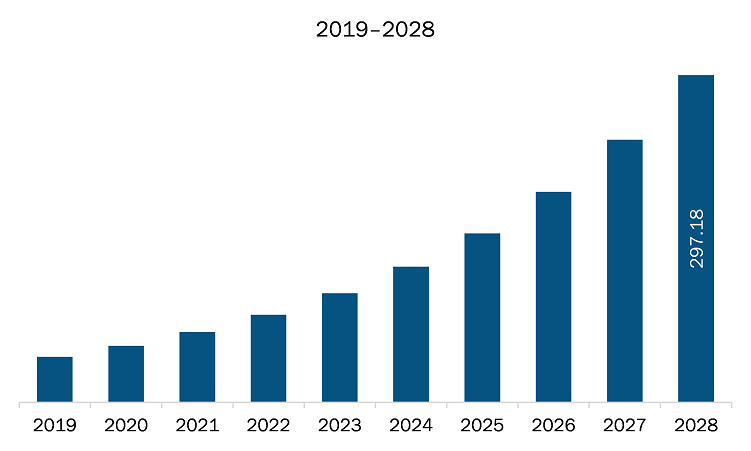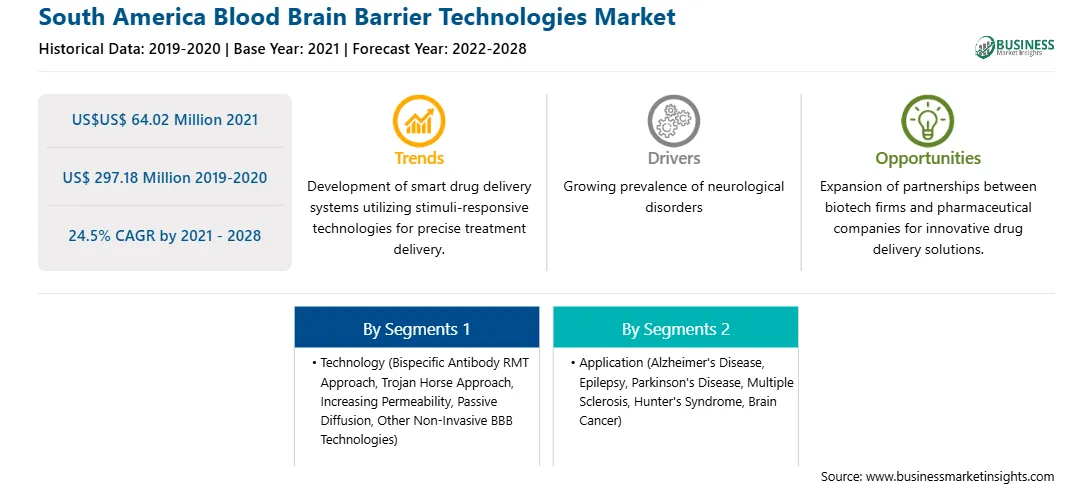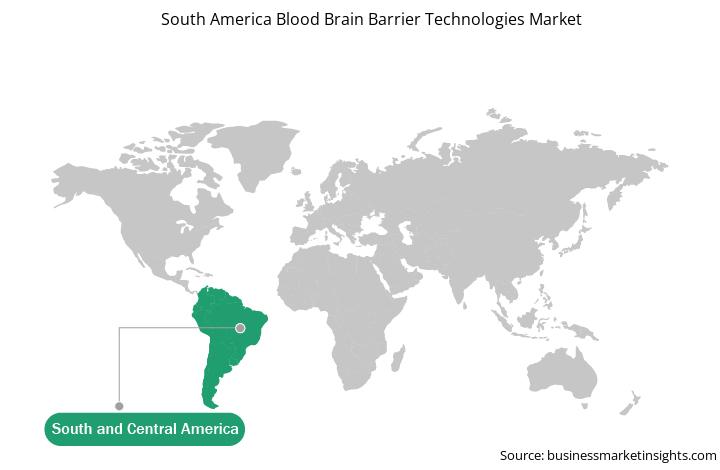Market Introduction
South America region consists of Brazil, Argentina, and rest of SAM. Brazil is expected to have the major market share in this region. Brazil is the fifth largest country in the world both by area and by population and experiencing the fastest demographic aging worldwide and aging population develops age related neurodegenerative disorders, which is likely to increase the demand for the pulmonary devices in the country. In Brazil, the aging population is at a rapid pace and in a context of regional and historical socioeconomic inequalities. According to the study conducted in Brazil, the community of women estimated at the vast majority with 16.9 million (56%) of elderly persons, whereas older adults estimated approx. 13.3 million (44%). The prevalence of neurodegenerative disorders has been linked with the aging population in Brazil. Estimates from the Brazilian Institute of Geography and Statistics (IBGE) indicate that, by 2060, people over 65 years old will account for 25.5% of the population. The blood brain barrier technologies Market is being influenced by factors such as the increasing prevalence of brain cancer. For instance, as per Globocan 2020 report, brain cancer is the most common cause of death in Brazil. There were 12 260 new cases of brain cancer in Brazil in 2020 and 10 920 deaths due to brain and CNS cancers. This is likely to demand blood brain barrier technologies in Brazil. Similarly, 5 years prevalence rate for brain cancer in Brazil for all ages is around 15.17 per 100 000 population. In Brazil, the ischemic stroke is the common type of neurovascular diseases, accounting 61.8% of total deaths in 2016. This data was published by a study titled as ‘The burden of stroke in Brazil in 2016: an analysis of the Global Burden of Disease study findings’ it also stated that percentage was higher among the people aged 70 years and above. However, the mortality rates due to stroke have been reduced in the country. The development and improvements in the country have led to easy access to education and technology. Also, the advancement in primary health care has focused on prevention of the stroke and other neurological disorder.
The presence of various developing countries in South America makes this region one of the key markets for the future growth of the blood brain barrier technologies market. The growing population, rising disposable income, growing awareness related to daily health diagnostics, and rise in prevalence of neurological diseases are some of the key factors that are expected to drive the growth and demand for blood brain barrier technologies treatment in this region. However, the high number of confirmed cases and deaths due to COVID-19 in major South American countries such as Brazil, Peru, Chile, Ecuador, and Argentina are anticipated to affect the market demand in these countries. Headache, fever, anosmia, ageusia, as well as encephalitis, Guillain-Barre syndrome, and ischemic stroke have all been linked to infection with the severe acute respiratory syndrome coronavirus 2 (SARS-CoV-2). SARS-CoV-2, which is responsible for the current coronavirus disease (COVID-19) pandemic, can enter and affect the central nervous system (CNS) through a variety of routes, including axonal retrograde transport or interactions with the blood-brain barrier (BBB) or blood-cerebrospinal fluid (CSF) barrier. It observed low replication of SARS-CoV-2 that was accompanied by a very moderate inflammatory response. All these factors are expected to positive impact the growth of blood brain barrier technologies market in this region in the coming quarters.
Strategic insights for the South America Blood Brain Barrier Technologies provides data-driven analysis of the industry landscape, including current trends, key players, and regional nuances. These insights offer actionable recommendations, enabling readers to differentiate themselves from competitors by identifying untapped segments or developing unique value propositions. Leveraging data analytics, these insights help industry players anticipate the market shifts, whether investors, manufacturers, or other stakeholders. A future-oriented perspective is essential, helping stakeholders anticipate market shifts and position themselves for long-term success in this dynamic region. Ultimately, effective strategic insights empower readers to make informed decisions that drive profitability and achieve their business objectives within the market. The geographic scope of the South America Blood Brain Barrier Technologies refers to the specific areas in which a business operates and competes. Understanding local distinctions, such as diverse consumer preferences (e.g., demand for specific plug types or battery backup durations), varying economic conditions, and regulatory environments, is crucial for tailoring strategies to specific markets. Businesses can expand their reach by identifying underserved areas or adapting their offerings to meet local demands. A clear market focus allows for more effective resource allocation, targeted marketing campaigns, and better positioning against local competitors, ultimately driving growth in those targeted areas.
South America Blood Brain Barrier Technologies Strategic Insights

South America Blood Brain Barrier Technologies Report Scope
Report Attribute
Details
Market size in 2021
US$US$ 64.02 Million
Market Size by 2028
US$ 297.18 Million
Global CAGR (2021 - 2028)
24.5%
Historical Data
2019-2020
Forecast period
2022-2028
Segments Covered
By Technology
By Application
Regions and Countries Covered
South and Central America
Market leaders and key company profiles
South America Blood Brain Barrier Technologies Regional Insights

Market Overview and Dynamics
The blood brain barrier technologies market in South America is expected to grow from US$ 297.18 million by 2028 from US$ 64.02 million in 2021. The market is estimated to grow at a CAGR of 24.5% from 2021 to 2028. Nanomedicine is a rapidly developing field with nanoparticles or nanostructures for medical applications, particularly in the underdeveloped area of drug delivery to the brain. Great expectations are placed on the ability of multifunctional nanoparticles (NPs) to cross the blood-brain barrier. Recent advances in nanotechnology allow otherwise poorly distributed drugs in the brain to be packaged into nanoparticles with brain-targeting properties. These targeted carrier systems enhance the delivery of drugs by entrapping or encapsulating the drug in the particle with a targeting peptide/ligand on its surface that results in BBB targeting. These carrier systems cross the BBB using transcellular pathways such as receptor-mediated endocytosis. A significant advantage of solid lipid nanoparticles is that their high lipid solubility physically stabilizes the nanoparticles, which increases the carrying capacity of the drug and results in a controlled release rate of the drug. Although lipid-based nanoparticles and formulations have a prolonged systemic circulation time and increased tumor retention due to increased permeation and retention, their most important limiting factor is rapid clearance from the bloodstream through the reticuloendothelial system. Several groups are working to improve targeting to the brain by mounting nanoparticles with ligands, which are substrates for BBB uptake transporters, facilitating transit to the brain. As this technology advances, this system can effectively deliver a variety of therapeutic agents with a favorable toxicity profile. Thus, the use of nanoparticles for brain drug delivery is expected to be the trend during the forecast period.
Key Market Segments
In terms of technology, the increasing permeability segment accounted for the largest share of the South America blood brain barrier technologies market in 2021. In terms of application, the parkinson’s disease segment accounted for the largest share of the South America blood brain barrier technologies market in 2021.
Major Sources and Companies Listed
A few major primary and secondary sources referred to for preparing this report on the blood brain barrier technologies market in South America are company websites, annual reports, financial reports, national government documents, and statistical database, among others. Major companies listed in the report are Teva Pharmaceutical Industries Ltd.; F. Hoffmann-La Roche Ltd.; Eli Lilly and Company; Bristol-Myers Squibb Company; Pfizer, Inc.; and Johnson & Johnson Services, Inc. among others.
Reasons to buy report
South America Blood Brain Barrier Technologies Market Segmentation
South America Blood Brain Barrier Technologies Market – By Technology
South America Blood Brain Barrier Technologies Market – By
Application
South America Blood Brain Barrier Technologies Market – By Country
South America Blood Brain Barrier Technologies Market – Companies Mentioned
The South America Blood Brain Barrier Technologies Market is valued at US$US$ 64.02 Million in 2021, it is projected to reach US$ 297.18 Million by 2028.
As per our report South America Blood Brain Barrier Technologies Market, the market size is valued at US$US$ 64.02 Million in 2021, projecting it to reach US$ 297.18 Million by 2028. This translates to a CAGR of approximately 24.5% during the forecast period.
The South America Blood Brain Barrier Technologies Market report typically cover these key segments-
The historic period, base year, and forecast period can vary slightly depending on the specific market research report. However, for the South America Blood Brain Barrier Technologies Market report:
The South America Blood Brain Barrier Technologies Market is populated by several key players, each contributing to its growth and innovation. Some of the major players include:
The South America Blood Brain Barrier Technologies Market report is valuable for diverse stakeholders, including:
Essentially, anyone involved in or considering involvement in the South America Blood Brain Barrier Technologies Market value chain can benefit from the information contained in a comprehensive market report.